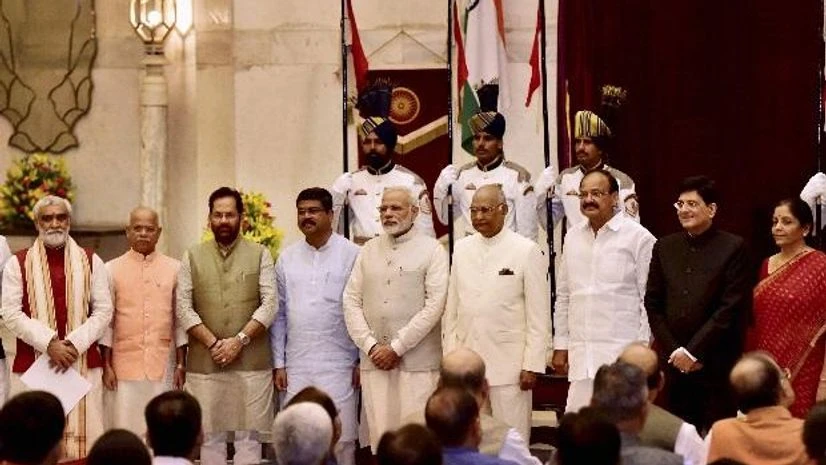The induction of nine ministers and the promotion of four others to the cabinet rank on Sunday is being seen as Prime Minister Narendra Modi's focus not only on governance but also to ensure that the BJP's political considerations are taken care of.
Dharmendra Pradhan, who took oath as a cabinet minister, has emerged as the party's face in Odisha and become one of its visible leaders as the party has highlighted the "success" of his ministry's scheme of giving free LPG connections to the poor in its political campaigns.
Odisha is among the states high on the priority list of party chief Amit Shah for the 2019 Lok Sabha elections.
Also Read
Pradhan's promotion about 20 months before the Lok Sabha as well as Odisha assembly polls can be a boost to the party in the coastal state. Both these elections are likely to be held there simultaneously.
Promotion of Naqvi and induction of former IAS officer Alphons Kannanthanam may help the saffron party in its minority outreach.
Alphons, whose administrative capabilities had often come in for praise when he was a bureaucrat, is a Christian hailing from Kerala, a state where the BJP has been working hard to emerge as a potent force.
The saffron party has wooed Christians, whose numbers are significant in the state, but not with much success so far.
Naqvi, well-liked for his affable and easy-going manners, will be the only Muslim cabinet minister in the Modi government.
Among the nine new ministers, three are Brahmins -- Shiv Pratap Shukla, Ashwini Kumar Choubey and Anant Kumar Hegde, two Rajputs, R K Singh and Gajendra Singh Shekhawat, one Jat (OBC) in Satyapal Singh and Virendra Kumar, a Dalit. Two others are from minority religions -- Hardeep Puri, a Sikh and Alphons, a Christian.
The induction of Shukla, a Rajya Sabha member who does not enjoy the best of equations with Uttar Pradesh Chief Minister Yogi Aditynanath, is seen an attempt by the party to keep Brahmins, a faithful support base, in good humour.
Choubey shares a good rapport with the RSS but has had an uneasy relationship with the party satraps like Sushil Kumar Modi in Bihar, a state the Buxar MP hails from.
With the BJP has focused on expanding its outreach among the OBCs in the state, Choubey's induction in the government is seen as a balancing act by the party.
It is the rehabilitation of R K Singh, who had lashed out at the party over its choice of candidates following its heavy loss in the Bihar assembly polls in 2015, that has surprised many when it appeared that he had been left out in the cold.
The former home secretary's administrative track record and image for honesty besides his Rajput origins might have come to his rescue after Modi decided to drop Rajiv Pratap Rudy, another Rajput leader from Bihar.
Former Mumbai top cop Satyapal Singh has been seen as an obvious choice after Sanjeev Balyan, also a Jat leader, was asked to quit ahead of the Cabinet rejig.
Singh had humbled RLD chief Ajit Singh in his pocket borough of Baghpat in 2014 Lok Sabha polls and his elevation can help the saffron party strengthen its hold on the community which is politically influential in western UP, Rajasthan and Haryana.
Virendra Kumar is a Dalit leader from Madhya Pradesh, which will go to the polls later next year, and a six-term Lok Sabha MP. He has long been associated with various wings of the RSS.
Hegde is a five-term Lok Sabha member from the poll-bound Karnataka and is known for his pro-Hindutva leanings.
The new ministers are also a mix of parliamentary experience and administrative capabilities. R K Singh, Satyapal Singh and Shekhawat are all first time MPs.
Shekhawat, whose state Rajasthan goes to the polls later next year, has impressed many with his research when he speaks in the Lok Sabha and has been a regular presence in Parliament.

)
